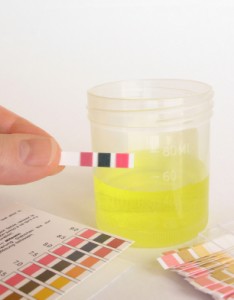What Is Your Pee Telling You?
Posted on 28. Mar, 2010 by Emma Deangela in Alkaline Diet Tips, Blog
 Before now, you’ve probably never given notice to your urine. In your mind, it’s probably one of those things you have to get done and over with. Perhaps you’re even guilty of holding it back for as long as you can take, especially when there are no restrooms in the area. But are you aware that your urine indicates your body’s pH level? Did you know that properly alkalizing your body all starts with examining your urine?
Before now, you’ve probably never given notice to your urine. In your mind, it’s probably one of those things you have to get done and over with. Perhaps you’re even guilty of holding it back for as long as you can take, especially when there are no restrooms in the area. But are you aware that your urine indicates your body’s pH level? Did you know that properly alkalizing your body all starts with examining your urine?
What is urine?
There’s a reason why urination—familiarly called ‘taking a leak’—should be done throughout the day. Your body needs to excrete the excess water and waste materials after it has been filtered by your kidney. What urine contains is a mixture of dead blood cells, waste compounds resulting from what you’ve eaten or drank, and chemicals that your body does not need. In other words, it is a reflection of what you eat and how well your body functions.
That’s precisely why a urine test check is considered a standard procedure in every visit to the doctor. By examining your urine, information on how well your kidneys manage your waste products can be identified. At the same time, it can also help in determining the causes of symptoms of health problems.
How can I diagnose my own urine?
Diagnosing your own pee may sound like a crazy idea, but if you’re serious about alkalizing your body and maintaining an acid alkaline balance in your body, this is the first step you have to take. In fact, a self-diagnosis of your own urine is helpful if you want to determine your basic health condition!
There are certain aspects about your urine that you should assess during self-diagnosis: color, clarity, and smell among other factors.
First is the color of the urine. An visibly clear urine indicates unregulated diabetes and a long-standing kidney problem. Red urine is also dangerous as it indicates blood in the mixture. Dark yellow urine means that your body is dehydrated. You will need to consume more water in order to hydrate your body. If your urine also has other unusual colors, such as orange, this is probably caused by certain supplements and foods that you are taking. For example, taking vitamin C supplements can give your urine a yellow color. This is a result of the washed-off Vit. C that your body wasn’t able to use up.
The second aspect, clarity, can be determined by how transparent your urine is. If your urine is somewhat cloudy, then this is probably caused by blood, bacteria, yeast, pus, or a parasitic infection.
The third, the odor of your urine, is easier to assess than you think. If the odor is unusually stale or pungent, this is caused by a urinary tract infection. If there’s a sweet smell about your pee, this is caused by uncontrolled diabetes. Other factors that influence your urine and may give it an unusual smell include your fibrous vegetables, antibiotics, bacterial infection, and other vitamins.
If you detect something abnormal about your urine and want to have it checked further by a doctor, you can prepare yourself by asking these questions:
- What is the color of my urine?
- What foods have I eaten throughout the day?
- How often do I pee in a day?
- How much do I pee? Has it continually increased or decreased?
- Is there blood in my urine?
- How long have I noticed an abnormality in my urine?
- Do I have a history of kidney problems?
- What is the cause of abnormal urine?
The causes of abnormal urination generally vary, but it has a lot to do with your diet. From the food you eat and the beverages you drink to the supplements you take, your urine is in many ways a representation of how healthy—or unhealthy—you are. If you’re not taking enough water, your urine will have a concentrated dark yellow color. This means that the ratio of the disposed chemicals and wastes to the disposed water is highly compromised. Drinking alkalized water in this case is highly recommended.
Also, keep in mind that your urine is the byproduct of toxic wastes that should be purged from your body. This includes the toxic acids that are pent up in your system, whether they are caused by your diet or stress or a polluted environment. In any case, you must excrete all that in your urine, or it will be stored in your body and ultimately lead to an acidic body.
How do I know what my pH level is with my urine?
With the strong connection between your pH level and your urine, how can you determine what your pH level is solely by checking your urine? You can simply use a simple urine pH test. In the morning, use a pH test paper and wet the paper with your morning urine. You can either dip the paper into the urine or urinate directly on it. The tape will then take on a different color. Correspond the color with its corresponding pH number.
If the number is below 6.5, then that means your urine is acidic. It can be caused by lung complications, diabetes, diarrhea and other health problems. If the number is above 7.5, then that means you are too alkalized. The range of a normal urine pH is 6.5 to 7.0, which means that your diet is doing well for your body and your urine.
If you find a pH imbalance in your body leaning towards the acidic level, you should seriously start alkalizing your body before your condition gets worse. With an acidic level, you are not only giving your body a difficult time dispensing your body wastes, you are also moving towards serious health complications.
How do you do this? The first step is to understand the principles of alkalizing your body. After doing so, follow these alkalizing principles strictly. And the best part? You will feel the immediate effects of alkalizing your body and it will reflect when you check your urine pH.
Read about our alkaline diet course to discover secrets to revitalize your health





charles cartwright
28. Mar, 2010
what color should my urine be I have been on High Blood Presure med and my urine id normally clear ? and I I have been on Master Cleasen for 6 days and this is my third time and I am still clear ?
Ammie
28. Mar, 2010
About a yr ago i was having intercourse with my partner and he stuck his penis inside my rectum and i told him to take it out. And before a knew it he stuck it back into my vagina. I knew that would cause a problem so we stopped. I experienced about 4 bacterial infections since then. And i would get a yeast infection after taking the antibiotics. Over the past year i have had chronic yeast infections month after month i have taken diflucan for the yeast. In the mean time i have been taking over the counter probiotics thinking that it would help. And nothing has helped me i cant have intercourse because i cant get rid of the infections. I have had std testing done everything comes back negative so why cant i get rid of the yeast once and for all?
irqza
23. Mar, 2011
hello,,i am 25 years old male and suffering from hematuria and in 2008 i had blood drops just after urine.doctro asked me for urine test and ultrasound but results were ok nothing found harm and took antibiotic for 1 week.then in the mid of 2009 the problem reoccured and i was sent again for same tests and they found much crystals in my urine that were irritating in bladder and again i took antibiotic and blood stoped.now few days ago i see the blood drops after urine and sometime in the end mixed with urine.another think i suffer from excessive wet dreams and sometime i stop the semins inside forcefully.withing week 3,4 times having wet dreams(night fall)ejaculation during sleep.color of urine is normaly yello.please help me out
Deborah
25. Jul, 2016
What contributes to urine being too alkaline?